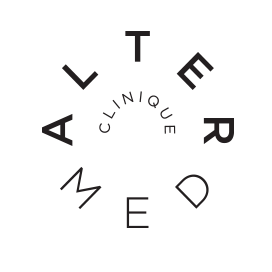clinique altermed
Montreal osteopathy Montreal physiotherapy Montreal acupuncture Montreal naturopathy Montreal masso-kinesitherapy Montreal nutrition
Complementary care serving women!
For over 15 years, Clinique AlterMed in Montreal has offered comprehensive health care through an interdisciplinary team: osteopathy, acupuncture, massage therapy, physiotherapy, psychology, naturopathy, and kinesitherapy.
Our vision is to place each person at the heart of their health journey, considering physical, emotional, and social dimensions. Women’s pelvic health is a vital yet often overlooked issue, and we respond with a compassionate, respectful, and collaborative approach.
Common symptoms and conditions
Our clinicians regularly work with women experiencing:
-
Endometriosis: cyclical pain, fatigue, digestive issues (source)
-
Pelvic inflammatory disease: chronic pain, impaired fertility
-
Uterine fibroids: heavy bleeding, pelvic pressure, urinary issues
-
Vulvodynia or vulvar pain
-
Post-surgical scarring (C-section, hysterectomy) and deep adhesions
-
Pelvic floor dysfunction: incontinence, prolapse, painful intercourse
Personalized approaches for every story
Therapeutic tools
We emphasize complementary, non-invasive techniques:
-
Pelvic osteopathy: gentle work on tissues and systems in tension
-
Massage therapy and kinesitherapy: targeted muscle release, pain management, gentle mobilization
-
Pelvic physiotherapy: functional rehabilitation of the pelvic floor
-
Acupuncture: stress modulation, hormone regulation, inflammation relief (study)
-
Psychotherapy: body-mind connection, support with trauma or chronic anxiety
-
Naturopathy: lifestyle guidance, anti-inflammatory diet, hormonal support
A comprehensive and collaborative evaluation
Each care plan is based on:
-
A complete functional assessment (symptoms, posture, habits)
-
Emotional history and medical background
-
Patient preferences (style of care, pace, hands-on vs. energetic approach)
-
Clear therapeutic goals: relief, prevention, support
Targeted physiological mechanisms
-
Neurogenic pain and central sensitization (source)
-
Chronic inflammation (notably in endometriosis)
-
Post-surgical adhesions and fascial mobility limitations
-
Chronic stress and related hormonal imbalances
Clear and measurable goals
-
Reduced pelvic and menstrual pain
-
Improved urogynecological function (continence, sexuality, digestion)
-
Return to movement, work, and active social life
-
Improved body relationship and overall well-being
Outcomes vary depending on diagnosis, chronicity, chosen approaches, and patient engagement in care.
Education, listening, and therapeutic alliance
Common patient feedback
-
“It’s all in my head” — No. Pelvic pain is real, even if imaging shows nothing.
-
“I have to live with it” — False. There are accessible, validated options.
Persistent obstacles
-
Uncovered costs for complementary care
-
Lack of specialized services in rural areas
-
Gap between conventional and alternative care, despite proven complementarity (source)
Interdisciplinary collaboration to drive change
Our model is built on a strong therapeutic alliance, involving communication between professionals, trust with the patient, and mutual recognition of each discipline’s value.
We prioritize:
-
Cross-disciplinary training
-
Shared care plans
-
A clinic where the human being comes before the protocol, and patients never navigate care alone
Modernizing pelvic care through listening and collective intelligence
Listen. Validate. Support. Provide care that makes sense.
Pelvic pain is not inevitable. With a compassionate, integrative, and collaborative approach, we can transform the physical and emotional experience of countless women—and help them reclaim agency over their health.


